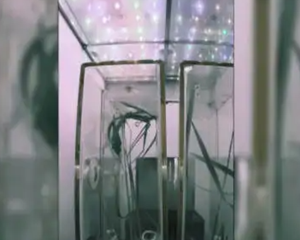The seeds of two plants in China's Wentian lab module have germinated and are now in good condition, according to a briefing Monday on the progress of plant culture experiments in the country's space station.
周一,据中国空间站植物培养实验进展简报称,在中国的“问天”实验舱中,两株植物的种子已经发芽,目前状态良好。
Seed samples of the two plants, Arabidopsis and rice, were installed in the life ecology experiment cabinet of the lab module, which went into space in July.
今年7月,载有实验样品拟南芥种子和水稻种子的实验单元,安装到了“问天”实验舱的生命生态通用实验模块中。
The space growth experiments were launched on July 29 with ground instructions.
7月29日,该太空生长实验通过地面指令启动。
The Arabidopsis seedlings have grown several leaves, and the rice seedlings have grown to a height of about 30 centimeters.
目前,拟南芥幼苗已长出多片叶子,水稻幼苗已长至30厘米左右的高度。

Later, their life cycle experiments will be conducted to obtain space seeds.
之后,它们还将进行全生命周期实验,以获得太空种子。
Around late September, the astronauts will collect the plant samples, then put them in a cold pack to keep them alive before returning to earth.
大约在9月下旬,航天员将收集植物样本,然后在返回地球之前将其放置在冷冻袋中保持活力。
Once they are back, scientists can study the plants.
当他们返回地球后,科学家将对植物进行研究。
Plant growth in space faces problems such as delayed flowering time, low seed setting rate, and decreased seed quality,
在空间条件下,会出现植物开花时间延迟、种子结实率低和种子质量下降等问题,
and only a few crops like rape, wheat, and peas have completed experiments in space to obtain seeds.
目前只有油菜、小麦和豌豆少数几种作物在空间完成了获取种子的实验。













